Two days in lockdown: In Maine shooting, the fear rippled further, lasted longer
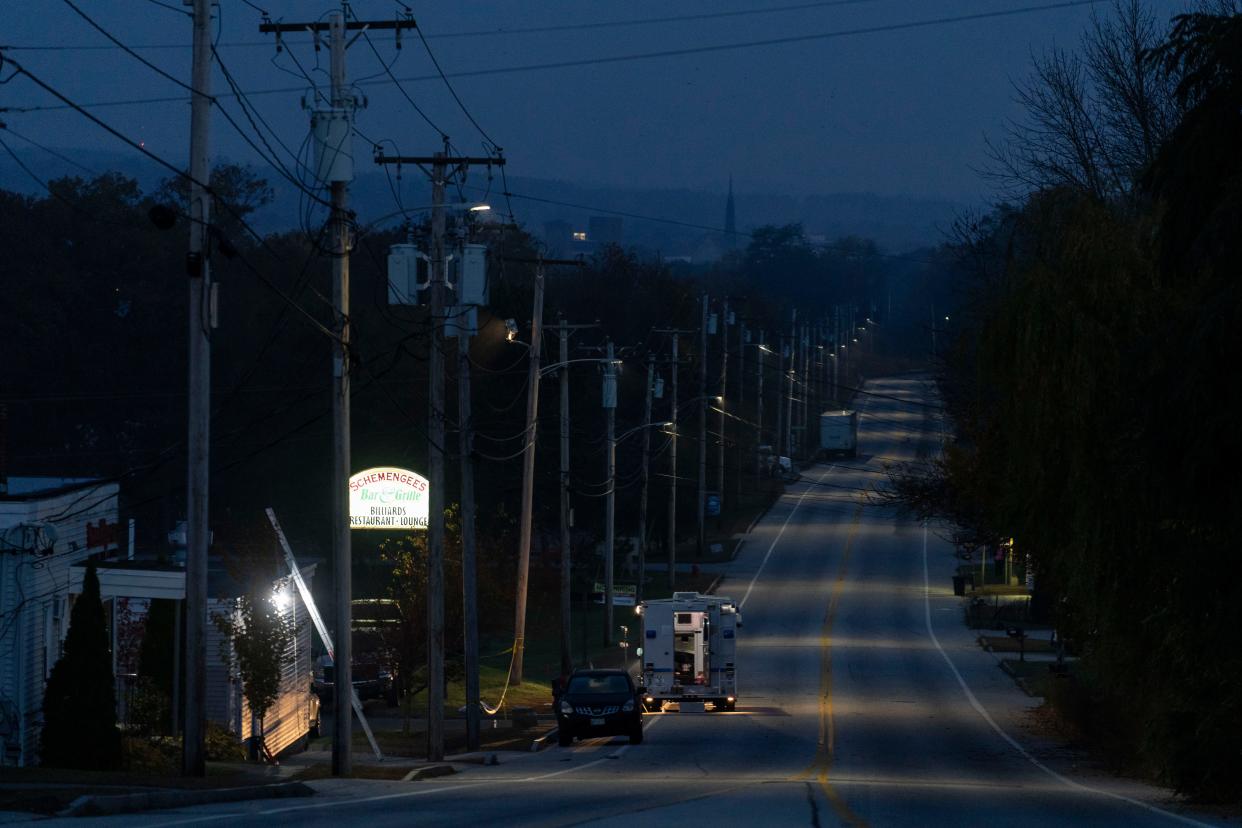
- Oops!Something went wrong.Please try again later.
LEWISTON, Maine – The lockdown began for one couple when the electronic voice of their 9-year-old son’s computer tablet read a chilling security alert aloud. An active shooter was on the loose.
For another Lewiston family, it started after their children, playing on a trampoline after middle-school sports practices, came inside with the same news shared by a neighbor.
For an 18-year-old student at a small college outside of town, a phone notification sent him rushing to his dorm to warn roommates, block the door and shade the windows.
The gunfire began Wednesday with little warning. First at a bowling alley, just before 7 p.m., where a youth league was playing. Next at a nearby bar, where a group of deaf people was playing cornhole. In moments, a man with a rifle had fatally shot 18 people and made Lewiston the scene of the year’s worst mass shooting.
Then he disappeared into the night, and two days of terrifying lockdown began.
Outside, as authorities hunted the gunman, police cruisers and ambulances raced along the main roads; helicopters thrummed endlessly in the sky. Inside, adults and children waited behind darkened windows.
Police issued a shelter order for areas expanding outward from the scene. Doors locked quickly Wednesday night in Lewiston, a former textile town of 37,000 people, and across the Androscoggin River in Auburn. Residents awoke Thursday to learn the suspect, Army reservist Robert Card, 40, remained at large amid a massive manhunt.
Schools as far away as Portland closed; some grocery stores across the state were shutting down. Mail service ceased. On one eerily deserted street, an electric sign read, “Shelter in place.”
By Friday evening, many had been holed up for almost two days. That often meant not going to work, not going to school – and not seeing one another.
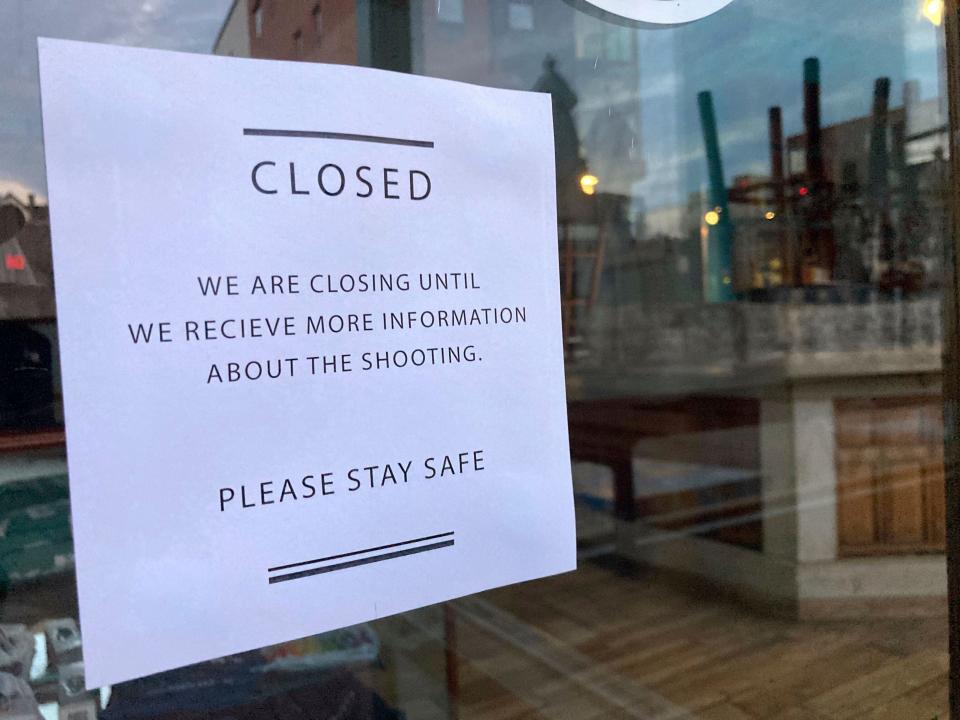
In Lewiston, it seemed, few people didn’t know someone who had been shot. Maine, one of the nation’s safest states, had seen nearly a year’s worth of homicides in a single night. Yet the indefinite lockdown also put on hold the public vigils and makeshift memorials that have become American rituals.
And that made Lewiston distinct amid the country’s drumbeat of mass shootings. Typically, experts say – in Buffalo, New York, and Uvalde and Allen, Texas – the shooter is caught or dead in short order. But in Lewiston, the mourning was displaced by the waiting.
“That's the other thing he's taken from us,” said Paul Englehart, a UPS worker, as he waited at home with his family. “We can't even get together and mourn the loss of these people because of him.”
The extended lockdown would end, but its reach may still deepen the emotional toll of shootings that hit smaller, closer-knit communities particularly hard, said Jaclyn Schildkraut, who heads the Regional Gun Violence Research Consortium in New York.
“It’s traumatizing to the entire region, because everyone will feel unsafe. And until that person is caught or discovered, those communities are not able to relax and return to normal,” said Peter Langman, an author and researcher on mass violence.
For two long days, as hundreds of law enforcement officers searched for the assailant in the wake of the shooting, including dredging near a boat ramp, residents could only wonder how long it would go on.
On quiet streets, waiting for bad news
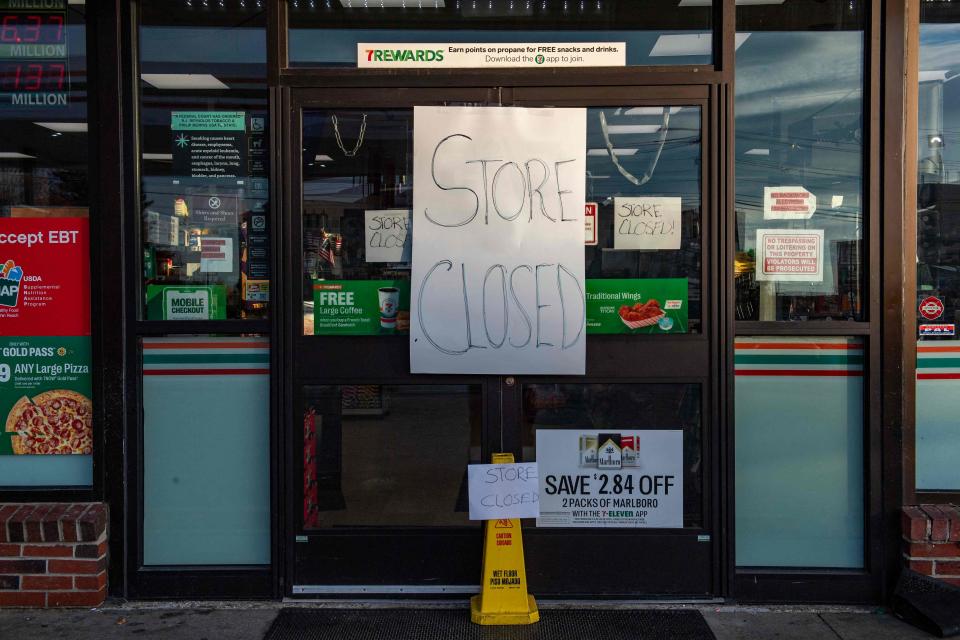
In a neighborhood near the bowling alley, Melissa Holmes and her husband had just finished driving the kids home from football and cheerleading practice, grabbing groceries and hitting the pharmacy.
Her husband was outside grilling dinner. The kids, twin 12-year-olds and a 13-year-old, were playing. No one heard any gunfire, she said.
Then, racing police cars and lights. Soon, like many in town, they were checking on others in town. Who was hurt? Who was safe?
On Friday, Holmes kept her children close as they turned over “hypotheticals” regarding the assailant and read rumors on social media. “Their little minds are going crazy right now,” she said.
Her own sense of security in the place she grew up was badly shaken. “It's like the Twilight Zone,” she said. “You don't want to believe it.”
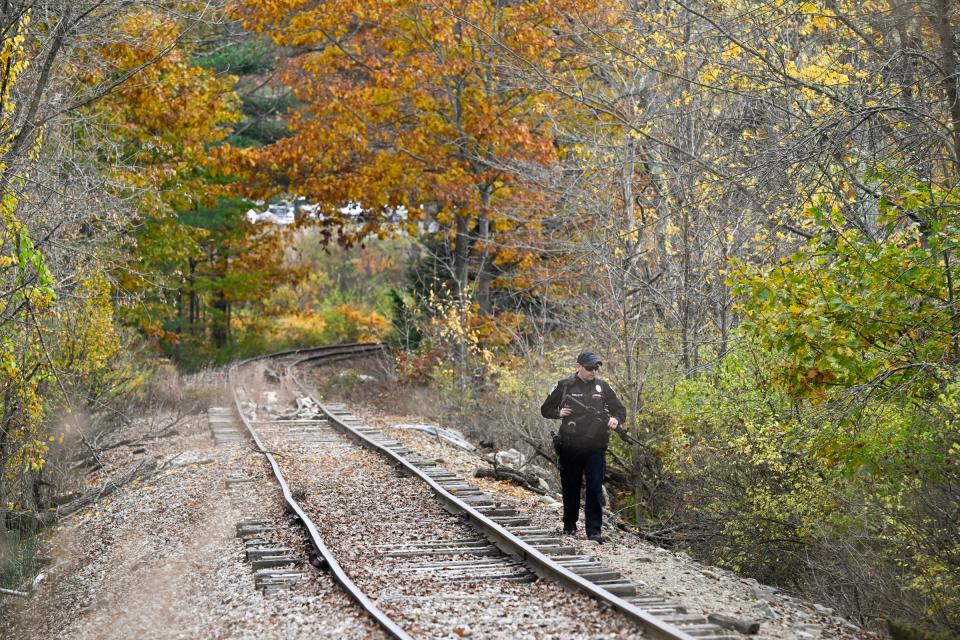
Across town, closer to the bar and grill, Richard St. Hilaire ventured out during lockdown but only as far as his driveway, to wash his SUV. In the neighborhood around him, window shades were drawn. The Little League fields in the park sat empty.
Out on the main road, police cruisers zipped back and forth. The road led to Lisbon Falls, where authorities had found the suspect’s car.
The 73-year-old retired veteran had been holed up since he heard sirens while taking trash cans out to the street Wednesday night. Back inside his house, he turned on the news. He and other residents received shelter-in-place orders via text on their cellphones.
He soon locked his doors and made sure his gun was loaded. On Thursday, the trash bins were still by the street.
"This is the quietest this street has been," said his wife, Diane St. Hilaire.
Chantel Reny, a 40-year-old Lewiston native who works in human services, sat outside at a nearby house, concerned because someone close to her daughter had been shot, but was expected to recover.
Reny texted with her 37-year-old sister, Danielle Reny, a district manager for Domino's Pizza. Their stores had stayed closed, but she turned on the ovens in one on Thursday, to cook pizzas for staff at nearby Central Maine Medical Center, where the emergency room had been hit with a surge of wounded patients.
Three people died after arriving at hospitals, officials said.
Seven died at Just-In-Time Recreation bowling alley, which had been hosting a youth bowling league. There, one mother said in a media interview that she laid atop her 11-year-old daughter to protect her. Among the dead was a part-time employee who came to play on a night off.
Eight more perished at Schemengees Bar and Grille, officials said.
Joseph "Joey" Walker was an avid pool player – some friends called him "Cue Ball" – whose father said he worked for much of his life in the electrical trades.
But Walker, 57, found true happiness more than seven years ago when he started to work at Schemengees as the bar manager, said his father, Leroy G. Walker Sr., who is an Auburn city councilman.
His son had run a billiards league. He also ran a youth program for dart throwers, the councilman said. He had waited overnight and into Thursday to receive news on what happened to his son.
On Thursday, police brought the news: His son had been shot and killed at the bar. They said that investigators had reviewed video recorded at the shooting.
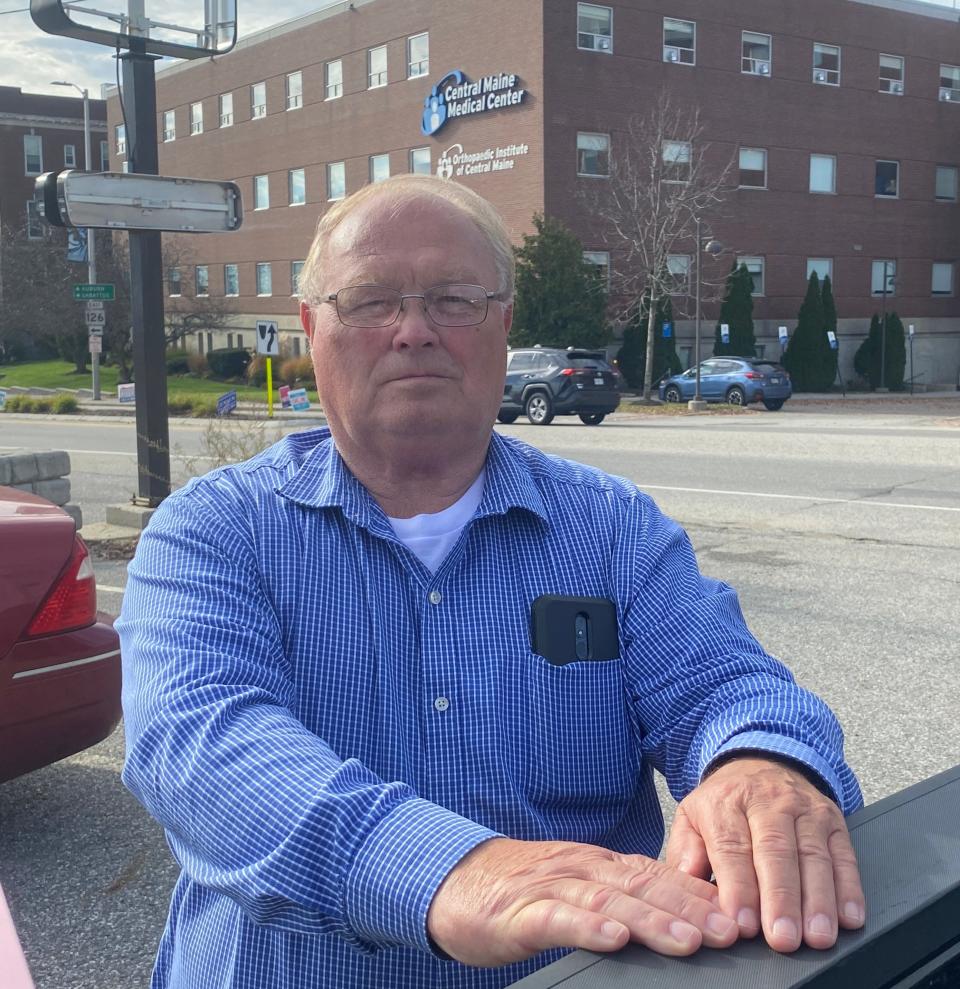
"That's the first time that I heard that my son had picked up a butcher knife and tried to go after the gunman and the gunman shot him to death,” he said. "At that point, he says ... 'Your son... was a true hero.'”
As for the gunman, he’d let God judge him.
“In the end,” Walker said, “they will get him. He will not get away with the crime.”
On Thursday night, officers in tactical gear surrounded a house outside of Lewiston. But no one was found.
The shelter-in-place advisory was extended.
‘Please just make sure y’all lock your door’
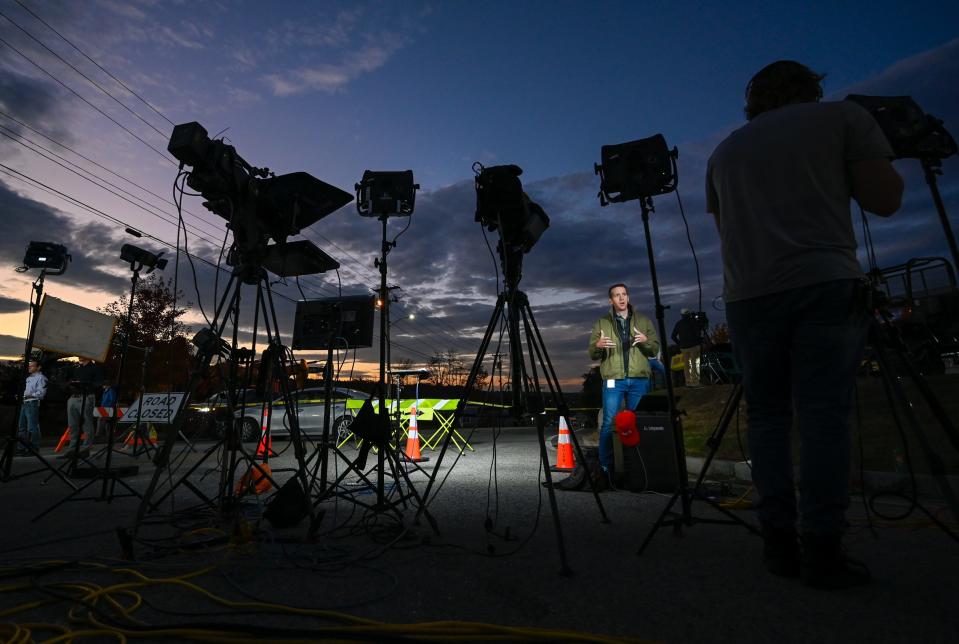
Just after 8 a.m. on Friday, Englehart, 50, found a grocery store open about 20 minutes away.
He jumped in his car to buy bread, chicken, butter and large bottled water jugs – the ones that usually got dropped off at his house, but now weren’t being delivered.
Back home later, his wife – Gabrielle Hathaway, 42 – chuckled watching a national morning TV show host describe their town as a place where no one locked their doors. In the city, she said, the people she knew did lock their doors.
Still, she called her father, who lives in the country: “Can you please just make sure y'all lock your door?”
Englehart had been taking off from his job with UPS. Some colleagues commuting to work had been stopped by police searching for the suspect. But he was staying home mainly for his 9-year-old son, Jett.
It was Jett’s tablet that had suddenly started reading the emergency alert aloud. “He is terrified,” Englehart said. It meant some difficult conversations during their lockdown.
“He came out and he was like, why are they saying there's an active shooter in our town?” Hathaway said. “You can't gloss over that anymore. He can hear the sirens. He can hear the helicopters.”
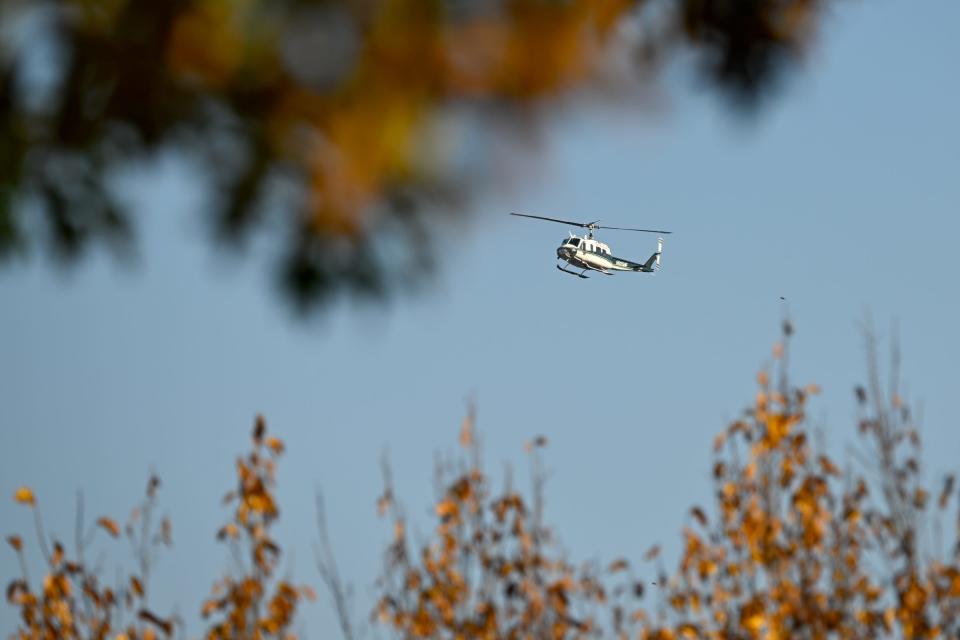
Jett was planning to enroll in the youth league at the bowling alley nearby, where the family often walked for pizza and a few frames. By Friday, he was reluctant to sign up.
Stuck at home, people connected on social media. Some debated the need for more mental health care after reports that the suspect had a history of hospitalization. Others argued for stronger gun laws in Maine. Here, permits aren’t required. “Red-flag” provisions, which aim to keep weapons away from people deemed dangerous, don’t exist.
But the immediate pain was in the waiting. They couldn’t create makeshift memorials with photos and tributes at the shooting scenes or gather for candlelight vigils.
The city held an online vigil Friday with local clergy members, prayer and music. Residents expressed their shock and pain in chat postings, describing themselves as angry, grieving, tired and heartbroken. Those watching at home were urged to light candles, The Associated Press reported.
Still, by Friday, there were signs people were starting to inch farther from their locked doors. A pizza place opened and a florist, who had been closed, was delivering – even though a driver said many weren’t answering their doors.
But the big question on everyone’s mind as the weekend approached was when – when would they catch the suspect so the town could exhale, get safely back outside and resume a sense of normalcy?
Even before the announcement, Hathaway wondered what would happen if the suspect wasn’t captured. Maybe it wouldn’t happen soon. Maybe it wouldn’t happen ever. Would they still have Halloween? How safe would parents feel?
“We're all sitting there going – 'what if?'” she said.
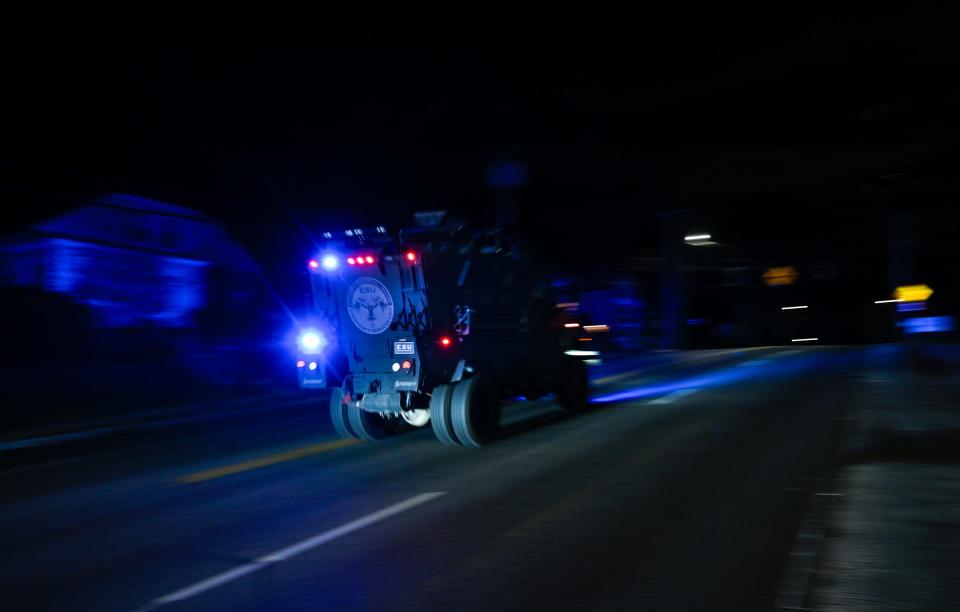
Then, late Friday afternoon, officials rescinded the shelter-in-place order. Maine Commissioner of Public Safety Michael Sauschuck said officials took into account the burden of closed schools and pharmacies. In addition, he said, “We had very pointed threats early on in reference to these locations, and nothing specific since then.”
Soon after, Englehart’s son – along with everyone else in the area – received an emergency message on the same tablet on which he’d gotten the initial warning: The shelter order had been lifted.
“He got pretty happy about that,” he said, as his son went outside for the first time since the shooting.
Englehart remained wary. He could still see an FBI vehicle parked nearby. Halloween was coming. “So hopefully they catch this guy soon,” he said. “And that'll put us all at peace.”
After 9 p.m., the news began to emerge. The suspect had been found dead.
In a wood-paneled room at city hall, Gov. Janet Mills stepped to a microphone. “Like many people, I am breathing a sigh of relief tonight,” she said. “I know there are some people, many people, who share that sentiment. But I also know that his death may not bring solace to many.”
Outside, in Lewiston, more late-night sandwich shops and drive-thrus reopened. Inside, behind darkened windows, parents and children could finally rest.
“If I don't sleep tonight it won't be because I'm scared,” Englehart said. “It's because we are happy.”
Contributing: Max Sullivan
This article originally appeared on USA TODAY: Maine mass shooting: How lockdown put grieving on hold

